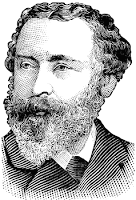In the House of Lords, the Prime Minister, Lord Salisbury, denies obstructing justice in the seamy Cleveland Street Scandal (see 16 January). Such allegations, he insists, are the product of "the wildest and most malignant imagination." The PM, no doubt, refers specifically to Henry Labouchere MP (left) who had been suspended from the House of Commons for declaring in debate, "I do not believe Lord Salisbury."
In both his newspaper, Truth and on the Commons floor, "Labby" had claimed the existence of "a criminal conspiracy by the very guardians of public morality ... with the Prime Minister at their head." He stopped short of pointing an accusatory finger at the Prince of Wales, whose trusted equerry is at the center of the scandal. Lord Arthur "Podge " Somerset, son of the Duke of Beaufort and manager of the Prince's stables, was reportedly a frequent visitor to the iniquitous establishment. At first, the loyal Prince refused to believe it. He told friends he'd find charges against the Archbishop of Canterbury more believable.
But, as the evidence mounted, the wheels of power turned and Somerset could be protected no longer. The young Lord managed to absquatulate for France the night before a warrant was issued for his arrest. Labouchere claimed Somerset had been tipped off. He said it was done to silence a scandal that "would deal a blow to the reign of the classes and to the social influence of the aristocracy."
The uproar prompted by Labouchere's implication that the PM had lied all but forced Salisbury to address the question in the Lords. He admits meeting with General Dighton Probyn, the Prince's counsel and "fixer." Salisbury insists "I certainly conveyed no secrets ... for the best of all possible reasons, that I had no secrets to convey." Yet, it was known to all that Probyn had left that meeting to meet with Lord Somerset, who fled within hours. History records more damning evidence: there is a private note that Lord Salisbury received from the Prince expressing thanks for allowing Somerset - a man he now conceded was "an unfortunate lunatic" - to slip away, rather than face "this awful charge."
As for "Podge," he settled on the French Riviera where he remained until his death in 1926. He never returned to England. The warrant for his arrest was never withdrawn.

No comments:
Post a Comment